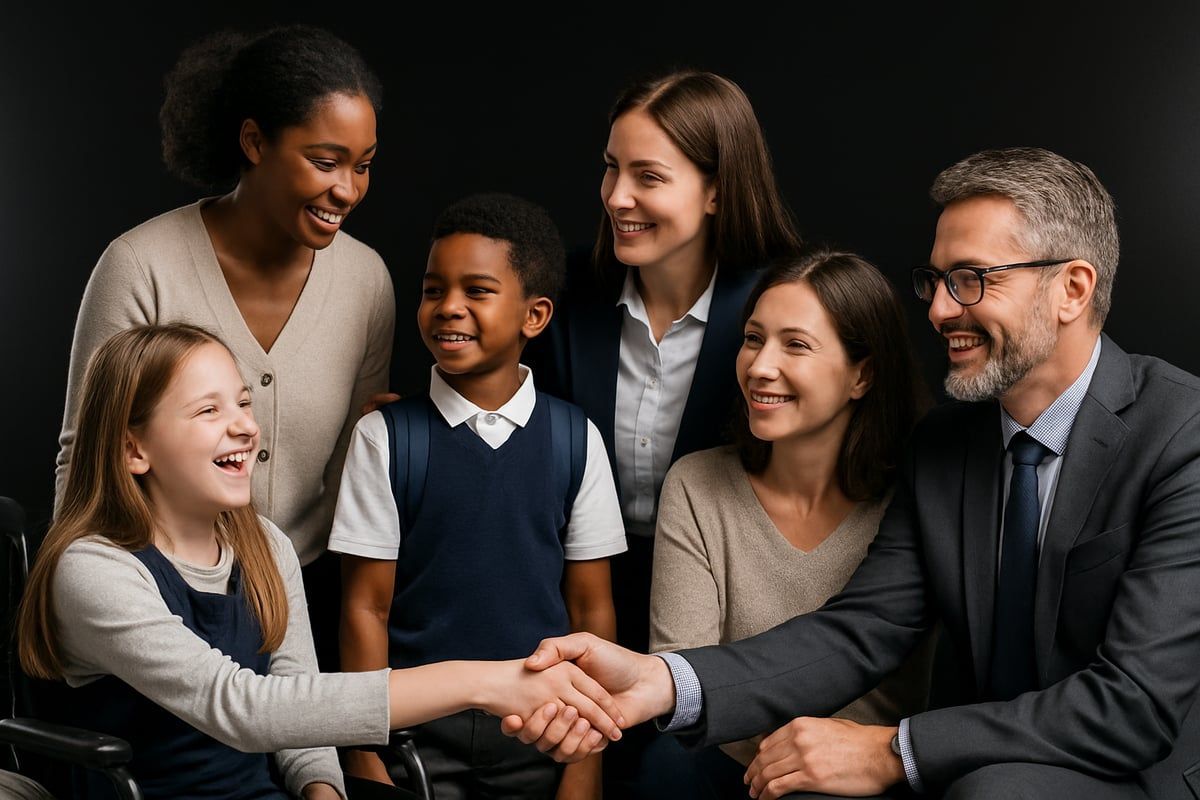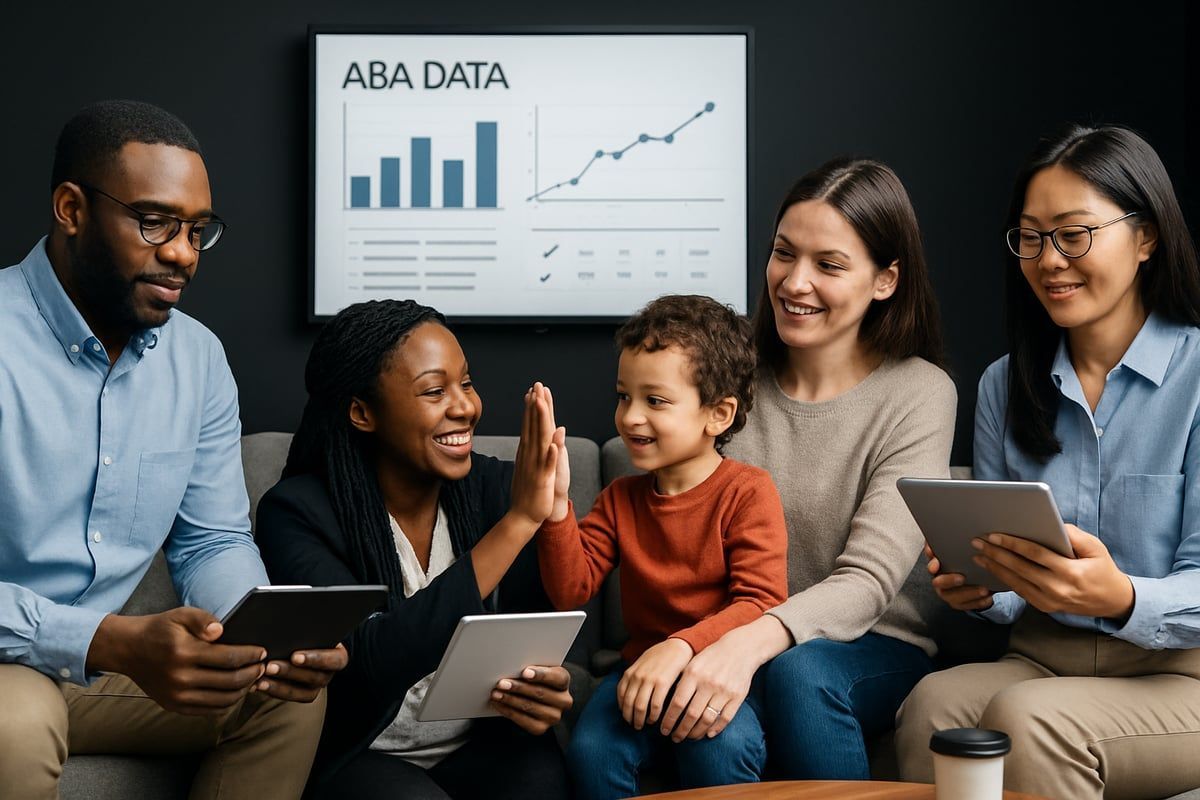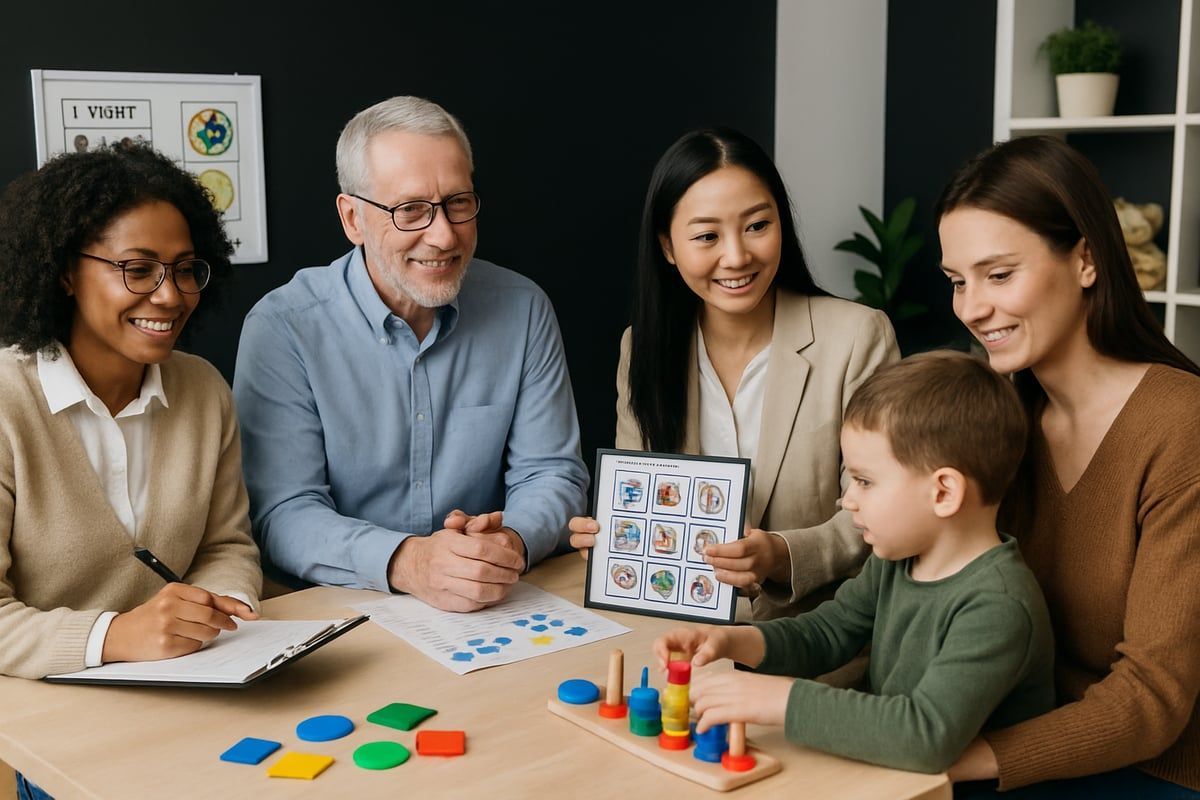In 2025, the demand for effective Social Skills ABA strategies continues to grow as social interaction remains a vital component of success in school, work, and everyday life—especially for individuals with autism and developmental disabilities. This essential guide offers a current overview of evidence-based ABA methods designed to strengthen social skills across age groups and settings.
Whether you're a parent, educator, or therapist, you'll gain practical tools and insights to support meaningful progress. Inside, you'll find a breakdown of ABA foundations, step-by-step strategies, age-specific approaches, group-based interventions, emerging technology trends, and tips for applying these methods in real-world scenarios. If you're ready to make a difference, dive in and start implementing these proven techniques—or connect with a qualified Applied Behavior Consultant for personalized support.
Understanding Social Skills in ABA: Foundations and Importance
Social Skills ABA is a cornerstone of helping individuals with autism and developmental disabilities build meaningful relationships and navigate daily interactions. These skills include communication, cooperation, emotional regulation, and perspective-taking—abilities that influence success in both structured and natural environments. ABA therapy supports social development by using evidence-based techniques that break down complex behaviors into manageable steps, reinforced through positive feedback. Understanding the role of social skills and how ABA fosters growth is essential for families, educators, and therapists committed to long-term outcomes.
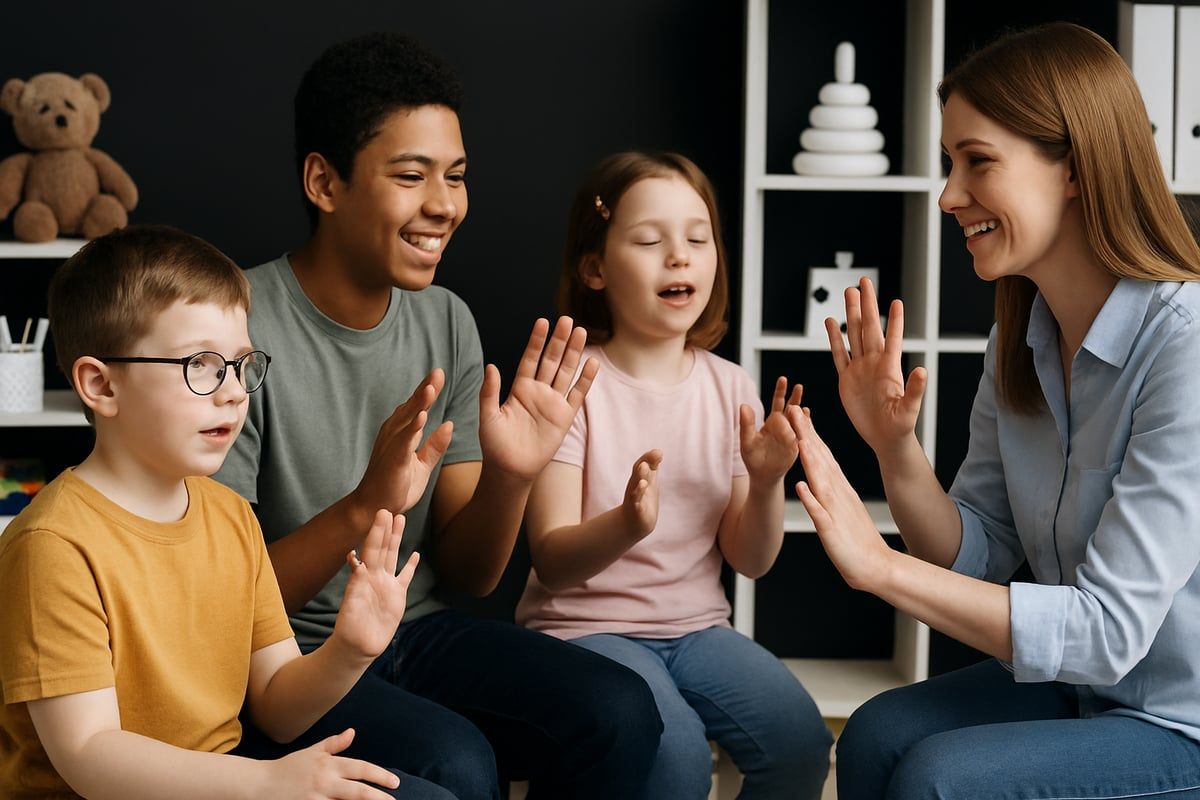
Defining Social Skills in ABA Therapy
Social Skills ABA focuses on a broad set of abilities that help individuals interact effectively with others. These include communication, cooperation, emotional regulation, and adaptability—skills that are essential for navigating social environments. In ABA therapy, social skills are measured through observable behaviors such as turn-taking, initiating conversations, making friends, and interpreting social cues. For children and adolescents, key developmental milestones often include sharing, responding to greetings, and recognizing facial expressions. Achieving these milestones can significantly enhance independence and overall quality of life. For example, when a child learns to join a group activity or respond to a peer’s question, they are laying the groundwork for future success in school and community settings.
Why Social Skills Matter for Autism and Developmental Disabilities
Social Skills ABA is especially critical for individuals diagnosed with autism spectrum disorder (ASD), where social challenges are a core feature. These difficulties can affect communication, peer relationships, and participation in everyday activities. According to CDC data from 2023, approximately 1 in 36 children in the United States were diagnosed with ASD, underscoring the growing need for targeted social interventions. Without structured support, deficits in social skills may lead to isolation, anxiety, and reduced self-esteem. Early and ongoing ABA-based interventions help mitigate these risks and open pathways to academic success, employment, and meaningful relationships. Families often report increased confidence and emotional well-being when social skills are actively developed through ABA therapy.
ABA’s Proven Effectiveness for Social Skills Development
Extensive research confirms that Social Skills ABA leads to measurable improvements in peer interaction, communication, and emotional understanding. Peer-reviewed studies and meta-analyses consistently support ABA-based interventions such as Discrete Trial Training (DTT), Natural Environment Teaching (NET), Social Stories, and Video Modeling. These evidence-based methods are designed to teach and reinforce specific social behaviors in structured and natural settings. Results are promising: targeted social skills improve in 70 to 90 percent of participants across various age groups and diagnoses. While ABA is highly effective, it’s important to tailor programs to individual needs and follow ethical best practices to ensure meaningful, respectful outcomes.
Core Social Skills Targeted in ABA Programs
Social Skills ABA programs are designed to strengthen both verbal and nonverbal communication, active listening, and appropriate social responses. Key components include initiating and maintaining conversations, recognizing and regulating emotions, and resolving interpersonal conflicts. Common ABA interventions may focus on building eye contact, practicing greetings, and developing cooperative play skills. For example, a structured ABA session might teach a child how to ask for help, share a toy, or express feelings in a safe and constructive way. These foundational skills are essential for long-term success in academic settings, workplace environments, and community life.
Step-by-Step ABA Strategies for Social Skills Development in 2025
Creating effective Social Skills ABA programs in 2025 requires a clear, individualized approach that ensures learning is both meaningful and measurable. The process typically begins with a thorough assessment to identify specific social skill deficits and strengths. From there, consultants develop customized intervention plans that include targeted goals, teaching strategies, and reinforcement systems. Implementation involves structured sessions, naturalistic practice, and ongoing data collection to monitor progress. Adjustments are made based on performance and feedback, ensuring the program remains responsive to the client’s evolving needs. This step-by-step framework supports consistent growth and helps individuals build the social competencies needed to thrive across all stages of life.
Step 1: Assessment and Individualized Goal Setting
The foundation of any effective Social Skills ABA program begins with a comprehensive assessment. This process involves standardized tools, direct observation, and collaboration with families and educators to identify each individual’s strengths and areas for growth. Creating a detailed social skills profile allows consultants to set personalized goals that are specific, measurable, and meaningful. For example, a school-aged child may need support initiating conversations or responding appropriately to peers.
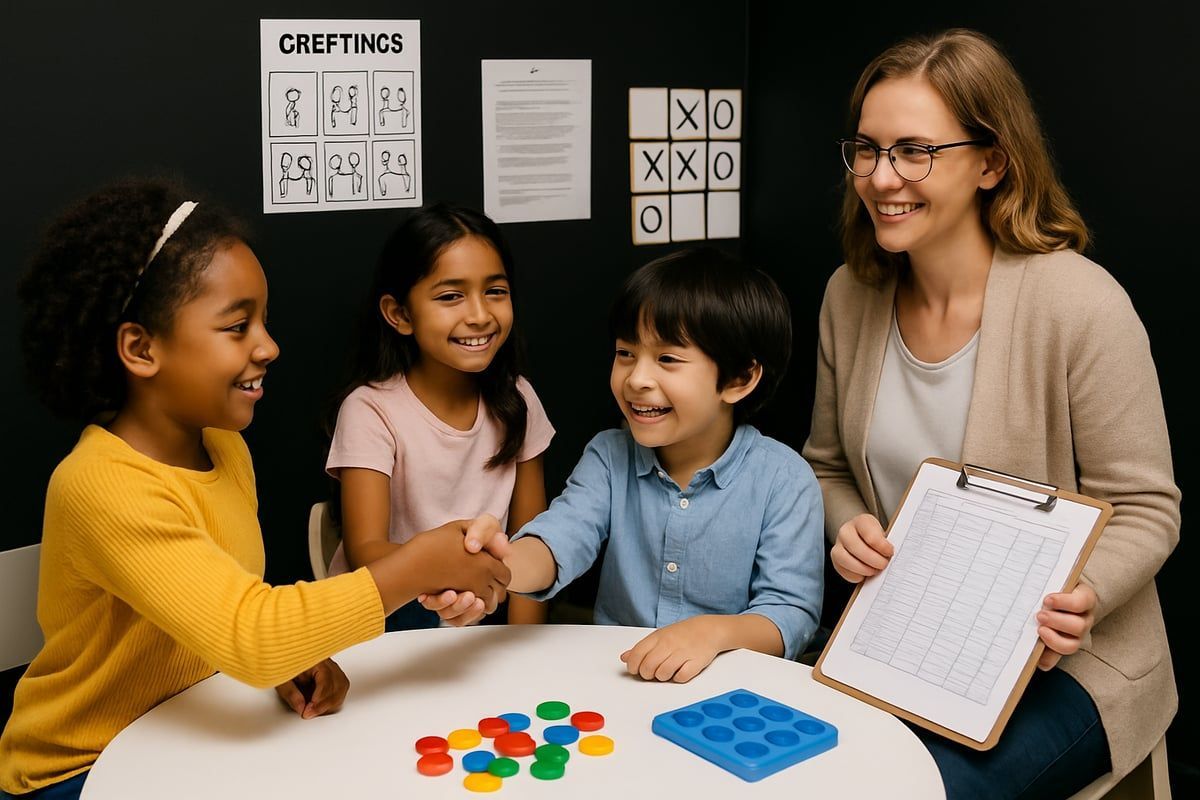
These goals serve as the roadmap for intervention and are revisited regularly to ensure they evolve with the child’s development. Ongoing assessment and open communication among team members help maintain alignment and drive consistent progress.
Step 2: Discrete Trial Training (DTT) for Foundational Skills
Discrete Trial Training (DTT) is a core strategy in Social Skills ABA, particularly effective for teaching foundational behaviors. This method breaks down complex social skills into smaller, teachable components, making learning more manageable and less overwhelming. In a structured DTT session, a therapist may focus on building eye contact, practicing turn-taking, or reinforcing greetings. Each behavior is taught with immediate feedback and positive reinforcement, accelerating skill acquisition. Research supports DTT’s effectiveness in helping individuals master basic social behaviors, and consistent repetition ensures these skills become second nature over time.
Step 3: Natural Environment Teaching (NET) and Generalization
Social Skills ABA reaches its full potential when skills are practiced in everyday settings. Natural Environment Teaching (NET) embeds learning into daily routines, promoting generalization across home, school, and community environments. Examples include greeting peers during school drop-off, using teachable moments at the playground, or encouraging spontaneous conversation during family meals. Caregivers, teachers, and peers play a critical role in reinforcing these behaviors, helping individuals apply learned skills in real-world scenarios. NET increases the likelihood of lasting change by making social learning relevant and accessible throughout the day.
Step 4: Social Stories, Role-Play, and Video Modeling
Social Stories, role-playing, and video modeling are powerful tools within Social Skills ABA programs. These techniques use storytelling, practice, and visual examples to teach appropriate responses and improve understanding of social cues. For instance, Social Stories can prepare a child for transitions or new social situations, while role-play allows them to rehearse joining a group or resolving conflict. Video modeling is especially effective for visual learners, offering clear demonstrations of successful interactions. These strategies help make abstract social concepts more concrete and support a variety of learning styles.
Step 5: Peer-Mediated Interventions and Group Activities
Peer-mediated interventions are a dynamic component of Social Skills ABA, providing authentic opportunities for social learning. Structured peer interaction—such as playgroups, classroom buddy systems, or facilitated group sessions—allows children and teens to observe, imitate, and receive feedback from their peers. Often, peers are trained to reinforce positive behaviors, making the experience both motivating and effective. These group-based approaches build confidence, promote inclusion, and help generalize skills to new environments, making them a valuable part of any ABA social skills program.
Step 6: Data Collection, Progress Monitoring, and Program Adjustment
Ongoing data collection is essential to the success of Social Skills ABA. Therapists and families use tools like checklists, graphs, and direct observation to track progress and identify areas for refinement. Regular reviews ensure that goals remain relevant and interventions continue to meet the individual’s needs. Involving families in the monitoring process builds consistency and engagement across settings. For example, a progress chart showing improvements in conversation skills over time can guide future planning and reinforce the value of the intervention. This data-driven approach ensures that ABA programs remain responsive and effective.
Age-Specific ABA Approaches: Preschool to Adolescence
Supporting children and teens through Social Skills ABA requires adapting strategies to their developmental stage. Preschoolers may focus on basic play skills and sharing, while school-aged children work on peer interaction and emotional regulation. Adolescents benefit from more advanced social coaching, including conflict resolution and self-advocacy. Tailoring ABA programs to each age group ensures that interventions are developmentally appropriate and aligned with real-life challenges. This age-specific approach promotes consistent growth from early childhood through the transition to adulthood.
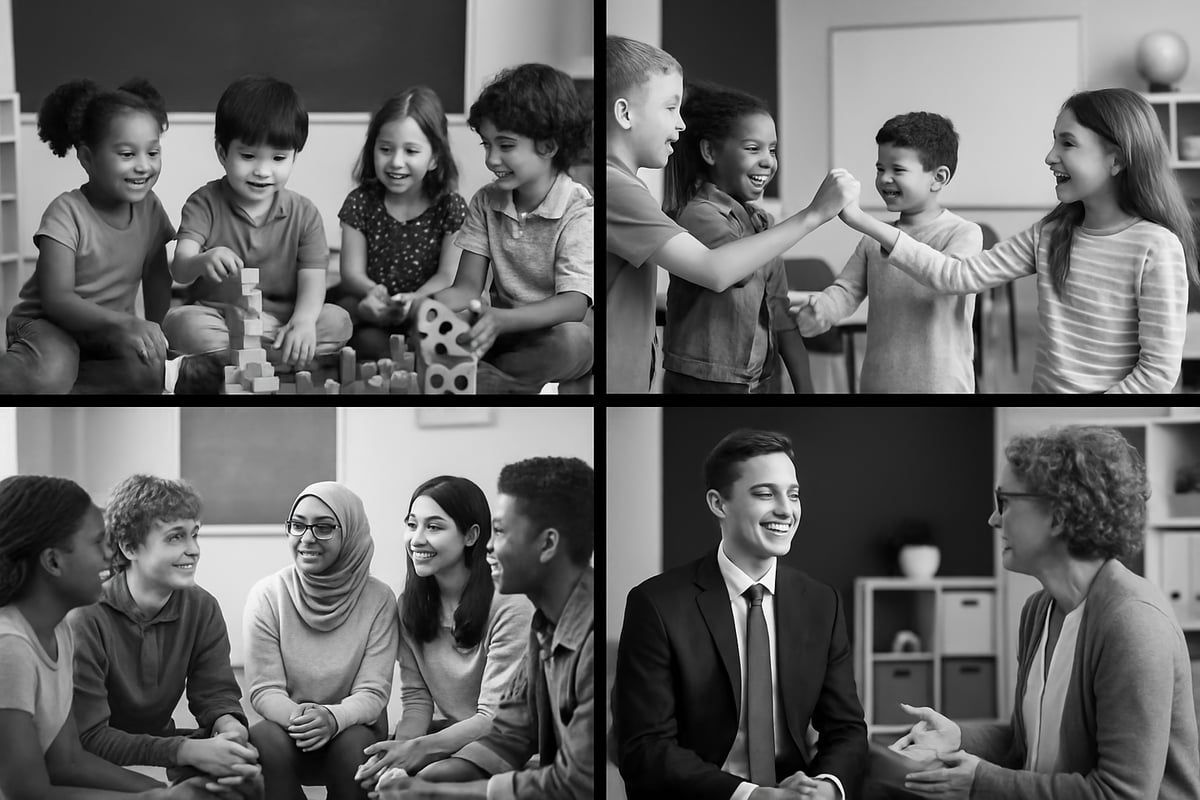
Early Childhood (Ages 2–5): Building Foundations Through Play
In early childhood, play is the foundation of learning, and Social Skills ABA interventions focus on creating joyful, structured opportunities for growth. At this stage, children learn through imitation, turn-taking, and sharing. Pretend play and cooperative games help young learners practice greetings, simple requests, and responding to peers in natural ways. Therapists often use routines such as circle time and small group playdates to foster these skills, while visual supports, songs, and role-play activities make learning engaging and fun. By nurturing these abilities early, ABA therapy sets the stage for lifelong social development and independence.
Elementary Years (Ages 6–10): Expanding the Social Repertoire
During the elementary years, children’s social worlds expand rapidly, and Social Skills ABA programs emphasize building friendships, following group instructions, and resolving conflicts. Structured games, classroom routines, and small group work provide safe spaces for practicing conversation skills and cooperation. Addressing challenges such as teasing or exclusion is critical, and ABA strategies often include scripts, social stories, and guided role-plays to help children respond with confidence. Teachers and therapists collaborate to reinforce these skills across settings, from the playground to after-school clubs. This period is crucial for developing resilience, positive peer relationships, and a stronger sense of belonging.
Pre-Adolescence and Adolescence (Ages 11–18): Navigating Complex Social Dynamics
As children transition into adolescence, social interactions become more complex, and Social Skills ABA shifts toward advanced skills such as conflict resolution, managing group dynamics, and understanding social hierarchies. Teens benefit from practicing emotional regulation, perspective-taking, and digital communication skills, including texting and social media etiquette. Group discussions, peer-mediated activities, and role-play scenarios help adolescents navigate situations ranging from unstructured lunch periods to online conversations. Emphasis is placed on self-advocacy and building confidence, ensuring that teens are prepared to succeed in school, friendships, and digital life.
Transition Planning: Preparing for Adulthood
Preparing for adulthood is a pivotal stage for individuals with autism and developmental disabilities, and Social Skills ABA programs shift focus toward real-world independence. Teens and young adults practice essential skills such as job interview techniques, community navigation, and self-advocacy. Collaboration with vocational programs and community partners ensures that ABA strategies are applied in practical contexts, including workplace simulations, public transportation, and community outings. Families and educators play a vital role in supporting goal-setting and celebrating progress. These experiences lay the groundwork for a confident transition into adult life and long-term success.
Addressing Unique Needs: Cultural, Linguistic, and Neurodiversity Considerations
Every individual brings unique backgrounds and strengths, and Social Skills ABA interventions must be flexible and respectful of cultural, linguistic, and neurodiversity factors. This means adapting strategies to honor family traditions, primary languages, and personal values. Therapists may incorporate multicultural social stories, bilingual instruction, or culturally relevant role-plays to ensure inclusivity. Emphasizing self-advocacy and individual choice empowers learners to connect authentically and thrive in diverse environments. By honoring diversity, ABA programs promote equity and meaningful engagement for all participants.
Group-Based Social Skills Training: Models, Benefits, and Best Practices
Group-based Social Skills ABA training provides a dynamic approach to learning by bringing individuals together in supportive environments. These programs encourage participants to practice, model, and reinforce positive behaviors with peers, creating opportunities for real-time feedback and social growth. Group settings foster a sense of belonging and make interventions more engaging and effective. By combining structured activities with peer interaction, group-based ABA programs help individuals build confidence, strengthen relationships, and generalize skills across multiple environments.
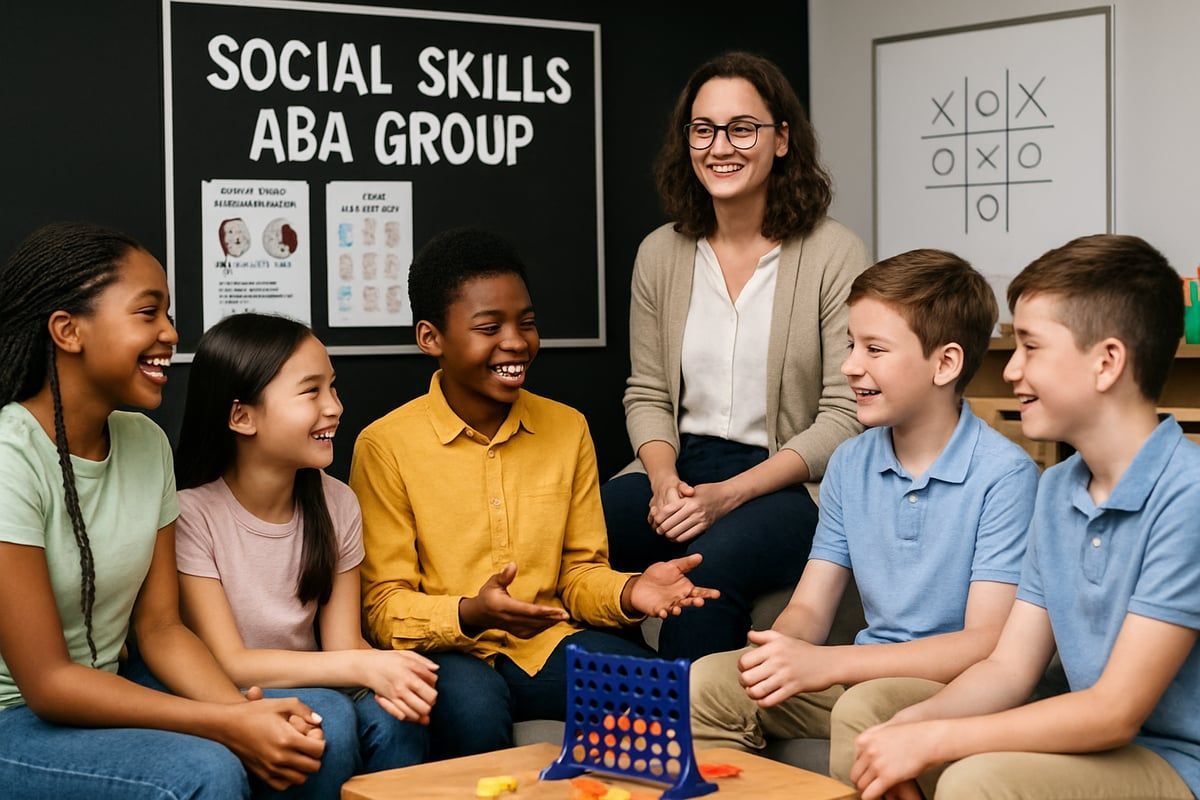
Group-Based Social Skills Training: Models, Benefits, and Best Practices
Group-based
Social Skills ABA training provides a dynamic approach to learning by bringing individuals together in supportive environments. These programs encourage participants to practice, model, and reinforce positive behaviors with peers, creating opportunities for real-time feedback and social growth. Group settings foster a sense of belonging and make interventions more engaging and effective.
By combining structured activities with peer interaction, group-based ABA programs help individuals build confidence, strengthen relationships, and generalize skills across multiple environments.
Structure and Types of Social Skills Groups
Social Skills ABA groups are designed to meet the diverse needs of participants by organizing sessions based on age, skill level, or shared interests. These groups are commonly offered in clinic-based, school-based, and community-based settings, with group sizes typically ranging from three to eight participants. A low adult-to-child ratio ensures individualized attention and effective support. Younger children often engage in play-based activities that emphasize cooperation and sharing, while older participants focus on conversation skills, emotional regulation, and real-world scenarios. Structured ABA group programs can be customized to match developmental stages and specific goals, making them adaptable and impactful across different populations.
Key Components of Effective Group Interventions
Effective group-based Social Skills ABA interventions rely on clear routines, consistent expectations, and a balance of structured and unstructured activities. Facilitators use games, role-play, and guided discussions to teach and reinforce social behaviors, while peer modeling allows participants to observe and practice positive interactions in real time. Regular feedback, visual supports, and ongoing data collection help track progress and maintain accountability. Communication with families ensures that skills learned in the group are reinforced at home and school, creating consistency across environments. These components make group-based ABA programs practical, engaging, and capable of driving lasting change.
Benefits and Challenges of Group-Based ABA
Group-based Social Skills ABA programs provide unique benefits by increasing opportunities for social interaction, peer support, and motivation. Practicing with peers helps generalize skills beyond one-on-one sessions and reduces the risk of social isolation. Many participants report higher confidence and stronger engagement after group experiences. However, challenges can arise, such as managing varying ability levels or addressing group dynamics. Facilitators must balance individualized support with group cohesion to ensure all participants benefit. With thoughtful planning and open communication, group-based ABA interventions can maximize participation and success for every learner.
Case Examples: Success Stories from Social Skills Groups
Real-world success stories demonstrate the transformative impact of Social Skills ABA groups. A preschooler who once struggled with sharing may learn cooperative play through guided activities, while a school-aged child gains confidence in resolving peer conflicts by practicing in a safe group setting. Adolescents benefit from group discussions around digital communication, learning to navigate social media respectfully and safely. These outcomes—such as improved friendships, stronger communication, and greater community participation—highlight the power of group-based ABA training in fostering meaningful social growth.
Integrating Technology and Innovation in Social Skills ABA for 2025
The future of Social Skills ABA is being shaped by technology and innovation, with 2025 bringing new opportunities for learners of all ages. Digital tools, hybrid learning models, and artificial intelligence are transforming how social skills are taught, practiced, and generalized. Telehealth platforms expand access to underserved communities, while apps and software streamline data collection and parent training. AI-driven tools provide personalized feedback and adaptive learning experiences, making interventions more efficient and engaging. By embracing these advancements, ABA professionals can deliver higher-quality care and prepare individuals for success in both digital and real-world environments.
Digital Tools and Apps for Social Skills Practice
Innovative digital tools are transforming Social Skills ABA by making interventions more engaging and accessible. Apps designed for conversation practice, emotion recognition, and interactive social stories provide valuable support both at home and in therapy sessions. Virtual reality (VR) offers immersive environments where individuals can safely practice scenarios such as public speaking or job interviews, while video modeling platforms deliver step‑by‑step demonstrations tailored to visual learners. Families and professionals increasingly rely on these evidence‑based resources because they are user‑friendly and effective. Reports such as Autism by the Numbers: 2023 Annual Report highlight how early technology integration can improve outcomes for children with autism. As ABA continues to adopt new digital tools, learners gain more opportunities to practice and strengthen social skills.
Remote and Hybrid ABA Social Skills Programs
Remote and hybrid models have become a core part of Social Skills ABA, offering flexibility and expanded access to families. Telehealth platforms allow therapists to deliver training directly into homes, while hybrid approaches combine in‑person sessions with virtual meetings to maintain consistency and accommodate busy schedules. These models increase family involvement, improve accessibility for rural or underserved communities, and enhance participant satisfaction. Recent studies show that hybrid ABA programs boost engagement and help learners generalize skills across multiple settings. In 2025, this flexible approach is making high‑quality interventions more widely available than ever before.
AI and Data Analytics in ABA
Artificial intelligence is revolutionizing Social Skills ABA by personalizing interventions and streamlining progress tracking. AI‑driven assessment tools help therapists set individualized goals based on each learner’s strengths and needs, while advanced data analytics platforms automatically track performance, visualize trends, and predict outcomes. Some programs now feature AI‑powered “social coach” apps that provide instant feedback during practice, motivating learners and guiding families with actionable insights. As technology advances, ABA therapy is becoming more precise, efficient, and responsive, ensuring interventions adapt seamlessly to each individual’s journey.
Future Trends: What’s Next for Social Skills ABA
Looking ahead, several exciting innovations are shaping the future of Social Skills ABA. Wearable technology is beginning to provide real‑time feedback on social cues and emotional states, while gamification makes practice more fun and motivating through interactive games. Programs are also placing greater emphasis on respecting neurodiversity and promoting self‑advocacy, ensuring interventions align with individual values. Ongoing research and policy developments continue to strengthen ABA’s effectiveness and ethical standards. Families, educators, and therapists can expect even more creative solutions for building social success in 2025 and beyond.
Practical Tips for Families, Educators, and Therapists
Creating supportive environments is key to successful Social Skills ABA. By fostering positive interactions at home and school, children are more likely to practice and generalize new skills. Simple routines, such as family meals or classroom buddy systems, provide natural opportunities for social engagement. These settings allow children to observe, imitate, and build confidence in their interactions. With autism diagnoses on the rise, as noted in the Autism Society’s response to CDC data, prioritizing supportive environments has never been more important.
Creating Socially Supportive Environments at Home and School
Establishing routines that encourage conversation and cooperation helps children practice social skills naturally. Family game nights, shared chores, and classroom buddy systems provide real‑life opportunities for ABA strategies to take root. Adults can model positive behaviors such as active listening and respectful greetings, setting the tone for children to follow. Predictable schedules, visual supports, and consistent turn‑taking activities reduce anxiety and reinforce expectations. Small, consistent efforts at home and school lay the foundation for long‑term social growth.
Collaborating with ABA Professionals and Multidisciplinary Teams
Effective Social Skills ABA requires collaboration among families, educators, and therapists. Regular communication ensures everyone understands the child’s progress and challenges, while consistency across settings reinforces strategies and goals. Scheduling check‑ins, aligning intervention plans, and sharing successes create a unified approach that makes it easier for children to apply learned skills in different environments. This team effort supports both short‑term progress and long‑term independence.
Addressing Common Barriers and Setbacks
Children may encounter anxiety, resistance, or frustration during Social Skills ABA sessions, and sensory sensitivities or co‑occurring conditions can further complicate participation. Adapting strategies and celebrating small achievements are essential for maintaining motivation. Visual schedules, social scripts, and offering choices help create predictability and foster engagement. Breaking tasks into manageable steps prevents setbacks from becoming roadblocks, ensuring children remain confident and motivated throughout their learning journey.
Generalizing Social Skills Across Settings
For Social Skills ABA to be effective, children must apply their skills beyond therapy sessions. Practicing in community settings such as playgrounds, stores, or libraries builds confidence and independence. Involving peers, siblings, and community members encourages natural interactions and supports generalization. Outings with specific social goals, gradual fading of prompts, and checklists for tracking skill use in new environments help ensure progress. Awareness of disparities in access, as highlighted by CDC QuickStats, underscores the importance of providing opportunities for all children regardless of background.
Monitoring Progress and Adjusting Strategies
Ongoing monitoring is central to the success of
Social Skills ABA. Families and therapists can use checklists, journals, or video recordings to track progress and update goals as new challenges arise. Involving individuals in self‑monitoring fosters ownership and accountability. Reviewing data at regular intervals and adjusting interventions based on observed needs ensures programs remain relevant and effective. Encouraging self‑reflection and goal setting keeps learners engaged and motivated, supporting continuous growth and long‑term success.
If you’re ready to put these proven ABA social skills strategies into action for 2025, Silveira Behavior Consultants is here to support you every step of the way. Whether you’re seeking group sessions, in‑home guidance, or school‑based support, our personalized approach is designed to fit your child’s unique strengths and challenges. Let’s work together to empower real growth and meaningful connections for your family. Inquire About Services today and discover how ABA can make a difference.



